
Lessons from the last days of Parler about #speakfreely and ‘Tech Tyranny’
A few days after a pro-Trump mob stormed the United States Capitol, Apple, Google and Amazon decided to cut all ties with Twitter competitor Parler. The platform was used to spread and promote hate and violence, and appeared to have played a significant role in the US Capitol attack. Apple and Google’s aversion from Parler made downloading the corresponding app nearly impossible. Amazon’s withdrawal from Parler, in addition, took the platform down completely. The conspiracy theorists, ultra conservative politicians and Extreme Right activists — substantively united by their support for Donald Trump — that had been converging on the platform immediately cried ‘discrimination’ and ‘collusion’; stating this meant ‘war’. An analysis of their responses to the apparent ‘cancellation’ of their platform reveals a complex fusion of very distinct values and beliefs.
Investing in Parler, Breitbart, Brexit and Trump
Parler was founded in 2018 by John Matze and Jared Thomson, and plugs itself as an alternative for other social networking platforms by focusing on “[f]ree speech and expression. Unbiased algorithms. We will never sell or share your data! We are a community of real people with a real message.” The ideological backdrop of these characteristics might already be demonstrated by the platform's investors. These include Robert Mercer, who played a key role in the Brexit movement and Cambridge Analytica and funded initiatives like Breitbart News and Trump’s 2016 presidential campaign. Other Parler investors about whom information is publicly available are conservative political commentator Dan Bongino, famous cryptocurrency enthusiast and Parler Chief Operating Officer Jeffrey Wernick — who describes technologies like Parler as “the best chance to break free from the cycle of tyranny and liberate humankind” — and prominent conservative donor Rebekah Mercer.

A screenshot of United States Senator Ted Cruz' announcement about his use of Parler on his Twitter account. Cruz is one of the most famous Parler users.
The networked boundaries of free speech
Though Republican Senator Ted Cruz already became an active Parler user in june 2020, the platform only started to gain broad popularity in november 2020, when platforms like Twitter increased their actions against the spread of misinformation; a development that resulted in the ‘hiding’ of a number of Trump’s tweets about the American presidential elections. Many of the individuals that moved from Twitter to Parler echoed Cruz’ words; mentioning concepts like ‘free speech’ and ‘censorship’. Parler became trending for a second time after Twitter suspended the @realDonaldTrump account at the beginning of January 2021, along with other accounts that spread violent, inflammatory or false information.
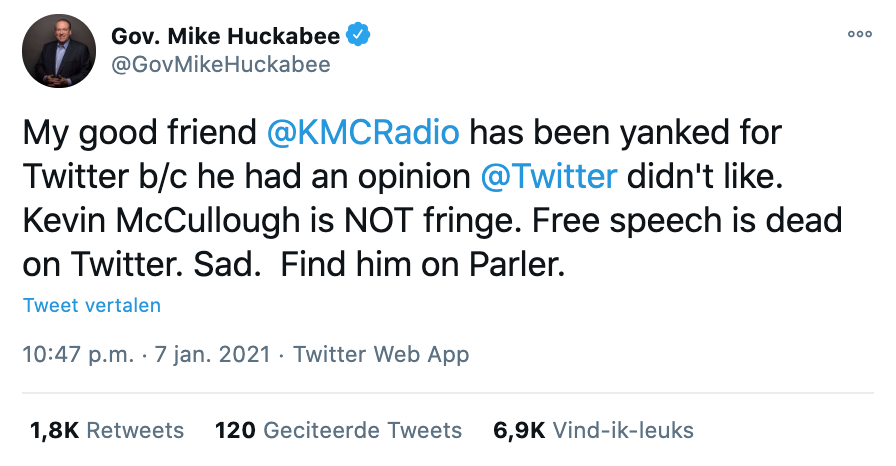
A screenshot of a tweet that was published by Republican politician and Christian minister Mike Huckabee about the suspension of conservative radio host Kevin McCullough's Twitter account.
Despite the fact that Parler was promoted as a platform where individuals can “speak freely” — as Cruz put it —, the reality turned out to be more complex and obstinate. For its downloads and updates, the Parler application was almost entirely dependent upon the infrastructure of Google’s Play Store and Apple’s App Store. Furthermore, for its hosting, Parler was reliant on Amazon’s AWS servers. These particular connections entailed that Parler’s users were not merely confronted with Parler’s beliefs about the boundaries of ‘free speech’ — which evidently appeared to be very broad —, but also indirectly with the rules and policies of the technologies and platforms Parler utilized.
Parler’s users were not merely confronted with Parler’s beliefs about the boundaries of ‘free speech’, but also indirectly with the rules and policies of the technologies and platforms Parler utilized.
According to Google, Apple and Amazon, the content that was produced and reproduced via Parler was unacceptable and in violation of their rules. This accumulated in the deletion of Parler from both app stores and a letter that was sent by Amazon on the 10th of January 2021 to Parler's Chief Policy Officer Amy Peikoff, which notified the Parler employees that their platform would be cut off from Amazon’s hosting services in 24 hours.
Gab's #speakfreely in Parlays
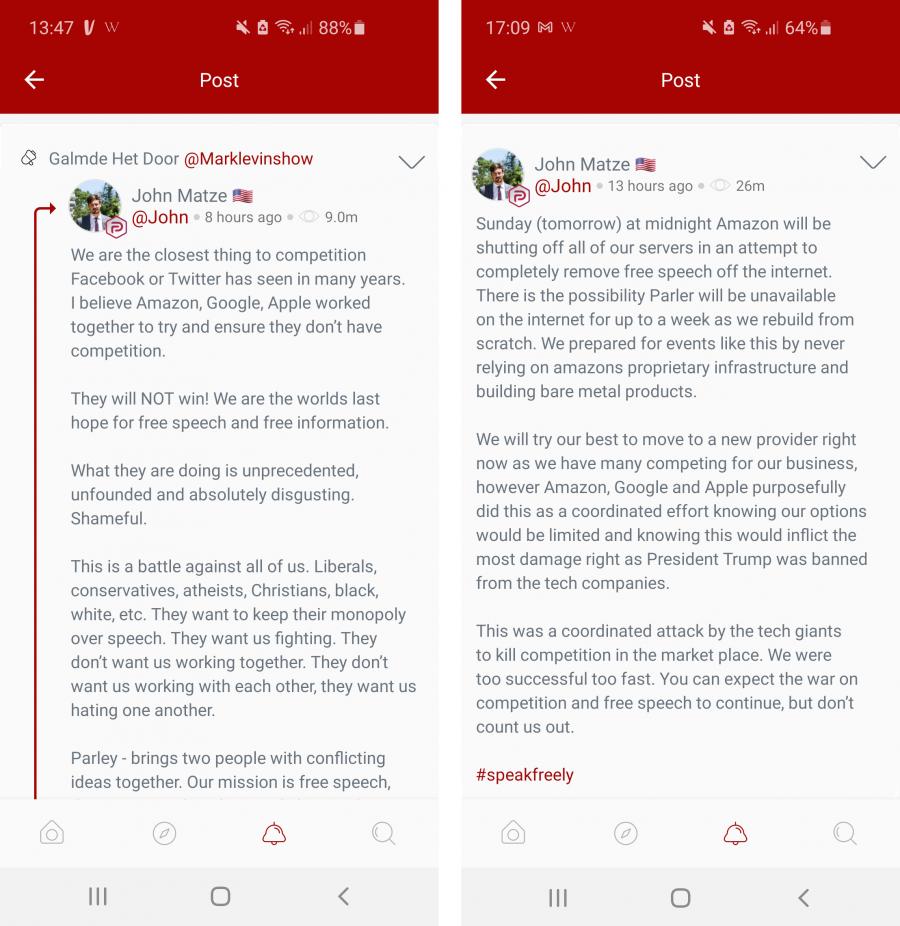
Left: a screenshot of a 'Parlay' — meaning; a post on Parler — that was published by Parler CEO Matze around 20:00 PST on January 9th. Right: a screenshot of a 'Parlay' that was published by Matze around 19:00 PST on January 9th.
In his response to the actions that were taken by Google, Apple and Amazon against Parler, Matze appears to reproduce Cruz’ words — “speak freely” — in a very particular manner, thereby referring to a highly specific discourse. The hashtag #speakfreely is also known as ‘Gab’s hashtag' because of its connection to the far-right platform Gab, which also promotes itself as a ‘free speech’ environment. Cultural scientist Ico Maly describes the #speakfreely hashtag as a ‘dog whistle’ that is used to communicate ideas to extreme right internet users without raising too much attention.
In the “war on competition and free speech”, major tech companies are framed as the villains, and the far-right “you” and “us” as the heroes.
Building on this, Matze’s statement that “[t]his is a battle against all of us” appears to be produced from a specific far-right perspective, rather than from a general ‘us’. Clearly, in the “war on competition and free speech”, major tech companies are framed as the villains, and the far-right “you” and “us” as the heroes. Consequently, tech companies are often connected to far-left movements and presented as powerful adversaries of free speech and freedom in general. This persuasion is described by Maly as “… the New Right myth in the mainstream that all (digital) media are owned by them left, which censors right wing conservatives”. (Maly, 2018)
However, in the case of Parler, potential commercial motives of major tech companies are also often highlighted — as is visible in Matze’s Parlays — in relation to the policies of platforms. This shows how the foundation of the dispute is framed as both ideological and commercial, which might demonstrate the perceived entanglement of these dimensions.
Tech companies as Democrat/Communist oppressors
In addition to the word ‘left’ — which actually does not appear to be used often in this specific context —, Parler users employ a whole variety of terms to describe major tech companies and associated nemeses. Terms like "tech gigants" and "Silicon Valley censorship" already seem to have a negative connotation, but might be regarded as moderate in comparison to other labels that are employed. In many Parlays, for instance, all major tech companies — not just Google, Apple and Amazon — are depicted as being communist.
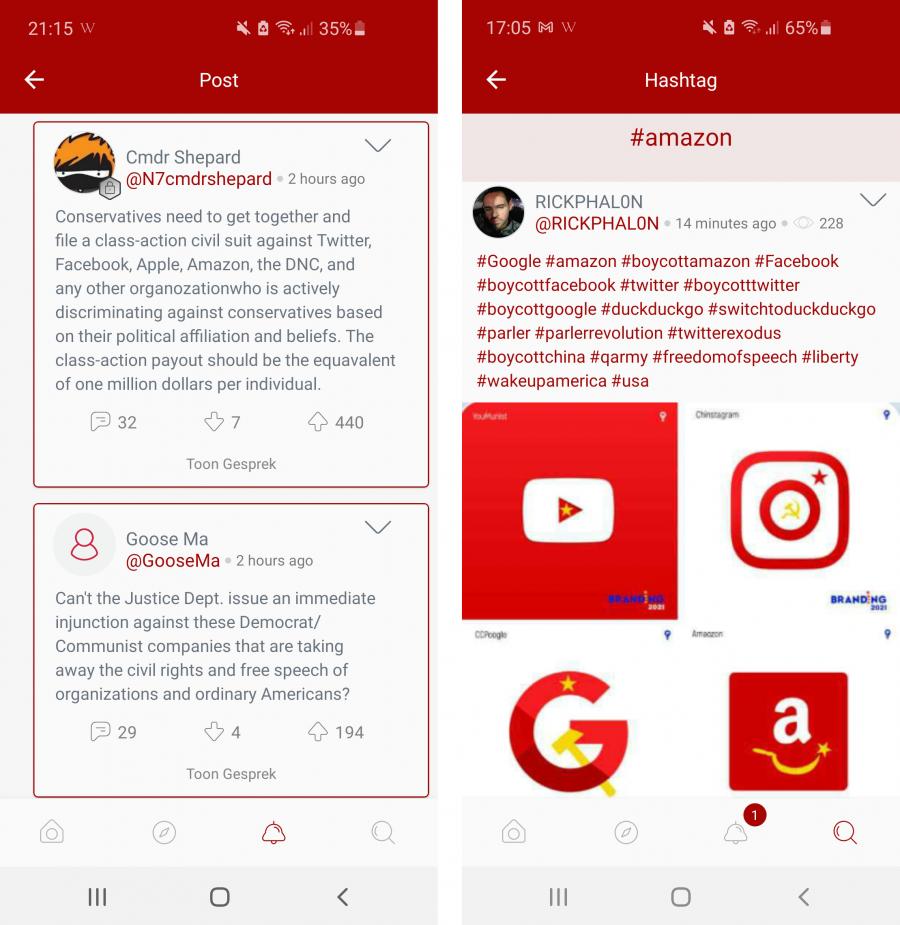
These screenshots from the Parler Android app show two different instances in which users of Parler connect the actions of Google, Apple and Amazon to Communism and China.
@GoosMa describes the tech companies that are involved in the measures against Parler as “... Democrat/Communist companies that are taking away the civil rights and free speech of ordinary Americans”. The proposed connection between major tech companies and the communist ideology must be seen in relation to a historic development that only started to emerge in its current form a few years ago. One of the first instances in which these themes converged was in Google’s Ideological Echo Chamber; a memo written by Google employee James Damore. The ten page memo mostly focused on what Damore perceived to be left bias, biological differences between men and women and Google’s harmful emphasis on diversity — which was, according to Damore, portraying the “white, straight, cis-gendered patriarchy” as “oppressor” (2017).
Damore’s memo shared characteristics with the ideas that were produced and reproduced in the ‘Manosphere’.
Altogether, Damore’s memo shared characteristics with the ideas that were — and still are — produced and reproduced in the ‘Manosphere’; a collection of websites that promote specific forms of masculinity and hostility towards women (Smits et al., 2018; Beekmans et al., 2018). However, what might have been most significant with regard to the proposed connection between communism and tech companies, is the fact that Damore only directly referred to the communist ideology once, in a footnote. Though the latter could suggest that the proposed connection was never intended to be the main message of the memo, this reference was picked up by the media, and addressed as one of the memo’s key points in interviews with Damore. From this perspective, media companies might have played a significant role in the creation and initial popularization of the original Google-communism-frame.
Google is communist, and China loves AI
Presumably more seminal, however, was a discourse that was produced by PayPal co-founder Peter Thiel. Initially, in January 2018, Thiel started to argue that “AI is communist”. This statement was reproduced and recontextualized by YouTube accounts that also promoted the values and beliefs of right-wing psychologist and alt-right celebrity Jordan Peterson — whose ideas are also popular within the Manosphere — and Donald Trump. Over a year later, after being invited to elaborate on his ideas about Artificial Intelligence — which is abbreviated as ‘AI’ —, Thiel argued that AI is communist because China loves AI, thereby introducing ‘China’ into the frame.
Another variation on this discourse was produced during the 2019 National Conservatism Conference. In this discourse, Thiel argued that Google is communist because it is developing AI in collaboration with the Chinese military — a statement that turned out to be false. Despite its falseness, Trump argued in response to Thiel's claims that Google should be investigated by the CIA; additionally framing Google as a traitor. Though no leads for any wrongdoing were found and no formal extensive investigation was pursued, the notion that tech companies might be betraying and threatening the United States’ values and beliefs had become mainstream.
Google is communist because it is developing AI in collaboration with the Chinese military — a statement that turned out to be false.
The radical libertarian beliefs that were produced and reproduced in Thiel’s discourse, accompanied by the alt-right misogynist persuasions from the Manosphere — white men feeling oppressed —, appear to have been internalized and further adapted by the users of Parler. The images that were published by @RICKPHALON, for instance, display tech companies’ corporate identities in the stereotypical ‘communist red’ with a variety of communist symbols. These images were accompanied with and promoted by a number of hashtags, which included #boycottchina — directly linking the images to Trump's discourse on Google, communism and China —, #freedomofspeech, #usa and #liberty. In this way, tech companies were framed as opposing the values contained in these hashtags.
Furthermore, the fact that these companies were no longer merely portrayed as ‘communist’, but as “Democratic/Communist” displays the proposed merger between communist tech companies and the American Democratic Party. This specific discourse, whose contemporary form — note that 'communism', for instance, was also used in older discourses and conspiracy theories (Stewart, 2002) — was first created by Damore and Thiel, appears to have come full circle: it now symbolizes the American tech industry’s social and political betrayal against the oppressed ‘ordinary people’ — often white men. The notion that a wide variety of concepts and discourses are brought together within this set of beliefs, helps to explain why such diverse groups of individuals flock together (Maly, 2021) to resist what they believe to be the oppression that was also felt by Damore.
'Tech tyranny' as a means to intensify the threat
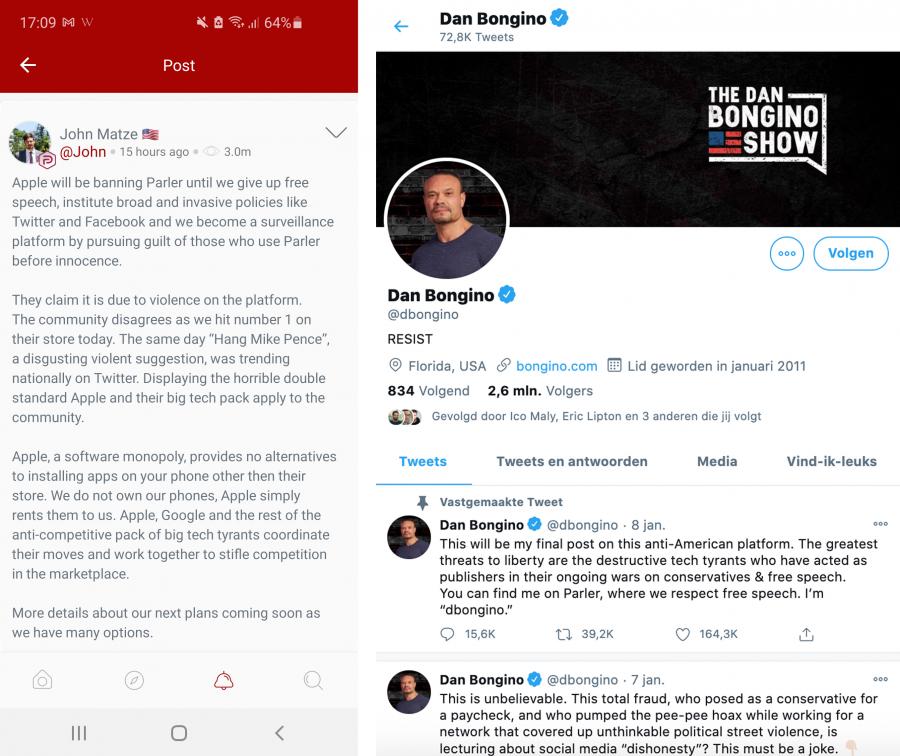
Left: Parler CEO Matze describes Apple and Google and "the rest of the anti-competitive pack" as "big tech tyrants". Right: Parler investor Bongino describes these companies as "tech tyrants".
In contrast with the ‘ordinary users’ of Parler, Matze and Bongino rather discuss the identity of tech companies in relation to their power — or ‘power abuse’, as they see it. The concept of ‘tyranny’ is fairly consequently used in Parlays and tweets that fit this perspective — think for instance Wernick's use of the word "tyranny" —, which is remarkable because words like ‘tyrant’ and ‘tyranny’ have been losing popularity since the end of the 18th century in general society. Therefore, just like the words “speak freely”, the words “tech tyrants” point towards a very specific discourse that constitutes a very specific set of values and beliefs.
The words “tech tyrants” point towards a very specific discourse that constitutes a very specific set of values and beliefs.
The words were, for instance, recently used in two book titles. The Tyranny of Big Tech was written by Republican politician Josh Hawley, who was the first senator to object to Biden’s victory in the 2020 presidential elections, and the first to support Trump’s voting fraud claims. The book remains unpublished because Hawley’s publisher withdrew its support in response to the events of the last few months and Hawley's role in these events. Still, information about the book is publicly available, often even as a number one search result on the Google search engine.
The second book, Big Tech Tyrants, was written by conservative author and media commentator Floyd Brown, who is famous for his dangerously misleading pro-Trump news stories. Though Trump does not appear to be of particular interest in Brown’s book, Amazon’s "frequently bought together"-data reveals that for the individuals who read this book, notions of resistance and of dishonest objections against Trump are clearly linked to the perceived tyranny of tech companies and the perceived existence of conspiracies against Trump.

A screenshot showing the books that are, according to Amazon's data, frequently bought together with Brown's "Big Tech Tyrants: How Silicon Valley's Stealth Practices Addict Teens, Silence Speech, and Steal Your Privacy".
Ultimately, the language that is used to describe major American tech companies in relation to their actions against Parler, frames these companies not merely as morally wrong, but also as treacherous hostile rulers, who are unrestricted by laws and will not shy away from cruelly oppressing society. In this sense, Google, Apple, Amazon and their associates have been discursively transformed into well-rounded enemies over the course of a few years, and are thereby seen as a dangerous addition to the classical enemies — political rivals and the original communists, for instance — that already existed. Evidently, this intensifies the perceived threat.
This is what digital warfare looks like
As mentioned before, Matze employs the word “battle” to describe the actions that were taken by Amazon, Google and Apple against Parler. The notion that a war or battle has to be fought is a recurrent theme on the platform.
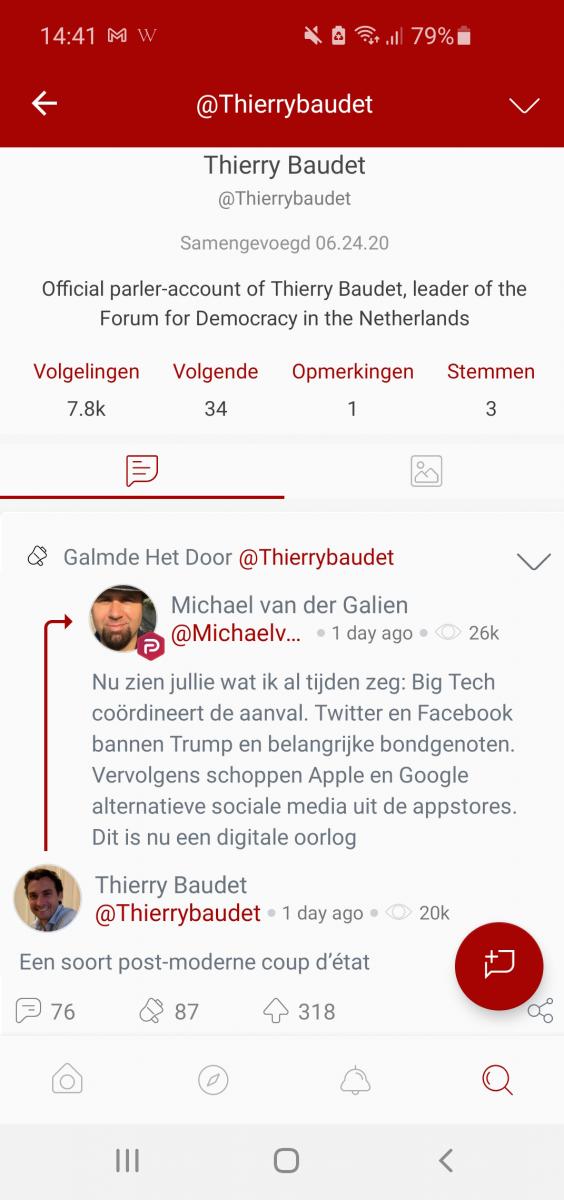
This screenshot shows how Dutch politician Thierry Baudet echoes and responds to a Parlay from Dutch right-wing 'opinionist' Michael van der Galien about "the attack" and "digital warfare".
In response to the measures that were taken by Google, Apple and Amazon, Dutch ‘opinionist’ Michael van der Galien argues that “Big Tech is coordinating the attack. Twitter and Facebook ban Trump and important allies. Subsequently, Apple and Google remove alternative social media from their app stores. This is a digital war.” [my translation] Dutch leader of Forum for Democracy Thierry Baudet responds by echoing this Parlay and by arguing: “Some sort of post-modern coup d’état.” [my translation] Just like in the previously analyzed texts, major tech companies are framed as the enemies — in these fragments even as the leaders of the enemies. Though van der Galien and Baudet neglect to dwell upon the precise content of the ‘battle’, ‘war’ and ‘coup d’état’ they are observing, it seems that they perceive the denial of platforms for the congregation and communication of specific social groups — conspiracy theorists and alt-right supporters, for instance — as a key hostile assault within the fight. In this sense, they appear to support the idea that this is a war on free speech and share the persuasion that Trump was wrongfully silenced.
They perceive the denial of platforms for the congregation and communication of specific social groups as a key hostile assault within the fight.
In this Parlay, Trump is directly mentioned. He has become the face of 'being silenced by tech tyrants'. Of course, in many other Parlay's, Trump is present between the lines. If it was not for Twitter's previous actions against Trump, many of the Parler users would have never downloaded the app. Because of Trump's indirect involvement in Parler — he does not appear to have had an account himself — his impact on the ideas that are produced and reproduced on the platform must be significant. Therefore, especially in connection to the use of the words 'battle', 'war' and 'coup détat', Maly's observation that the Trump 2020 election campaign adopted “the language of war” must be taken into account (Maly, 2020). According to Maly, an important element in this discursive strategy is the idea that the left is destroying the ‘voice’ of democracy.
This perceived threat is not only blatantly visible in Baudet and van der Galien's Parlays, but also in the other Parlays that engage with the potential final result of 'tech tyranny'; the destruction of free speech. Linking this part of Trump's campaign to the other discourses that were analyzed, Trump appears to be seen as the perfect protagonist in this story. Since the tech companies are framed as the 'bad guys', the individual that is most often and most harshly obstructed by these giants, but nevertheless refuses to give up, must be the 'good guy' — or 'on to something', as QAnon believers seem to think. In this sense, Trump is depicted as hard-fought, unfairly obstructed and persevering against the oppressors. If a battle should occur — or is already occurring —, Trump would clearly, in their eyes, be leading it.
Trump appears to be seen as the perfect protagonist in this story.
'War' as the only conclusion
Ultimately, It seems evident that a variety of values and beliefs have coincided in one massive narrative that seems to 'explain everything' for a growing group of individuals. In this narrative, notions of covert oppression and the destruction of freedom take center stage. The proposed expansion of the enemies that pose this threat — through the union of tech companies, communists and Democrats, for instance — and the proposed intensification and aggravation of this threat — 'tyranny' —, are employed to further underline the need and rightfulness of a battle. Furthermore, the notion of an imminent devastation and ‘silencing’ drives feelings of urgency. In the end — though the deletion of Parler is clearly not 'the end’ —, ‘the left’ is framed as an ever growing ‘Goliath’ while Trump and his supporters are portrayed as an ever more vigorous ‘David’. With all of this combined, the diverse social groups that are united by their support for Trump might not merely regard a 'war' as the right thing to do, but rather as the only option.
References
Beekmans, I., Sweep, A., Zheng, L., & Yu, Z. (2018, November 1). Forgive me father, for I hate women: anti-feminism and misogyny in the manosphere.
Damore, J. (2017, July 1). Google’s Ideological Echo Chamber.
Maly, I. (2018, November 2). GAB, fake news and metapolitics.
Maly, I. (2020, October 2). The Army for Trump and Trump’s war against Sleepy Joe.
Maly, I. (2021, January 11). Massa-radicalisering in de VS.
Smits, L., van Gorp, M., van der Jagt, M., Bakx, M., & Yacoubi, N. (2018, November 1). The extreme abnormals: sluthaters, the outsiders of the manosphere.
Stewart, C. J. (2002). The master conspiracy of the john birch society: From communism to the new world order. Western Journal of Communication, 66(4), 423–447.